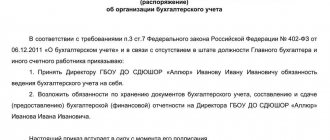What skills should an accountant have?
Features of skills assessment depend on what area of work a specialist is required for.
If the tasks of the future employee will include calculation, accrual and payment of wages, then, accordingly, the candidate must be able to do all this.
And also calculate taxes, prepare and submit reports to funds, and maintain various accounting forms. Of course, any accountant must know special computer programs .
If the company uses the 1C program, then the future employee must be able to create transactions in it, keep personalized records, and much more.
But more often, the employer, especially if the company is small, needs a universal specialist. In this case, the list of knowledge and skills is very wide. Interview questions when hiring an accountant should relate to the skills of the future employee.
An accountant must have the skills:
- accounting (accounting and tax);
- working with primary documentation;
- keeping records of mutual settlements;
- maintaining warehouse records;
- preparation of advance reports;
- drawing up reconciliation reports;
- budgeting;
- calculation of wages, compensation and sick leave;
- carrying out inventories;
- registration of incoming and outgoing documents.
Also, the accountant must know the Client-Bank system, accounting entries, be savvy in matters of legislation (accounting and tax) and know the basic provisions and instructions of the Central Bank of the Russian Federation. Computer proficiency is required - MS Office and 1C.
If a novice specialist with no work experience, but endowed with potential and willing to learn, is suitable for the vacancy, when assessing him, the main criteria will be a diploma of education in the field or retraining and his personal qualities.
In any case, an accountant is required to be diligent, attentive, and highly responsible . Thus, interview questions for an accountant should reflect the above criteria.
What types of consultations are there?
Many entrepreneurs choose oral consultations. For example, a company is engaged in metal rolling and the owner thinks that the business spends a lot of money on paying taxes. He comes to the office of a company that outsources accounting.
They listen to him carefully and understand the business. After this, they give a step-by-step plan to solve the problem. An entrepreneur listens to recommendations and implements them in business.
In such consultations, everything depends on the level of the accountant. If he is a professional, he will give effective recommendations that will help the business save money. True, the entrepreneur himself is unlikely to be able to explain the essence of the changes.
In Heaven there is a different approach to consultations. They are carried out only in written form. This is how we save our clients time and money. When communicating verbally, the accountant spends a lot of time finding out details. Only after that does he give advice.
When an entrepreneur poses a question in writing, the problem often resolves itself. This is actually true. When you describe the situation in text, everything falls into place.
Plus, when you receive a written response from an accountant, there will be links to regulatory documents. In addition, the answer can be saved or printed. If the situation arises again, just use this answer.
How can a candidate prepare for an interview?
When looking for a job, preparing for an interview is 50% of success.
If a candidate has already been invited for an interview, it means that his resume and/or cover letter have already attracted the employer’s interest.
This means they were compiled correctly. And understanding how an interview for a job as an accountant goes will help you avoid pitfalls.
What does an accountant need to know during an interview? What questions are asked at an interview for an accountant? Everything related to professional duties. We talked about what standard questions are most often asked during an interview and what to answer them here.
How to behave at an interview to get hired as an accountant? First of all, you need to feel confident during a conversation with a prospective employer or his representative, which means you need to do some work the day before.
Collect as much information as possible about the company where the interview will take place..
Visit the company’s website, look for mentions of it in the press and customer reviews, look at the photo and biography of the management. During an interview, the question “What do you know about our company?” is often asked.
Review your resume carefully, refreshing your memory of all the information from it. Based on your resume, prepare a list of answers to questions that the interviewer may have.
Prepare 2-3 versions of a short self-presentation - a story about your experience, professional skills and personal characteristics - so that the interviewer’s offer to talk about yourself does not take you by surprise.
Prepare your own list of questions for the employer about the company and about future responsibilities and working conditions. Everything that really interests you.
What should you wear to an interview as an accountant? It is worth choosing suitable clothes according to the style accepted in the company of the future employer. The Internet will help you find out what dress code is accepted in the company.
Relax and create the right emotional mood in order to behave naturally and feel confident during the interview.
More information on how a candidate for any position should behave correctly during an interview in order to leave a good impression can be found in a separate article, and general recommendations on how to organize preparation for an interview can be found here.
How to prepare for a consultation and what do you pay money for?
The main thing is to formulate the question itself. Sometimes I receive letters with the following content: “Hello! I want to open a company selling rolled metal. I heard that you can register an LLC or individual entrepreneur.” That's all. What exactly is the question? You need to ask in detail what exactly you want to know.
Some people do not understand what they are paying for when consulting. It’s like in clinics, people come in line and say that they just need to ask. But the expert spends time and applies knowledge to understand exactly your issue.
There are free consultations in Heaven. If you are registered in the service or have a subscription, you can ask questions to technical support. They will always help you figure out the problem that concerns the operation of the service.
True, this has its own characteristics. Every quarter, entrepreneurs have questions about VAT. They sound like this: “I posted all the bank statements, but the VAT return is not filled out.” It is immediately clear that the entrepreneur did not try to understand the issue, since invoices are used for VAT. And the work of the service has nothing to do with it.
If you need advice from a Sky accountant, then write to [email protected] Our managers will tell you in more detail how to do this.
Choosing the optimal type of interview
First of all, it is important to remember that it is necessary to communicate with each candidate for an accountant position individually.
Group interviews with several candidates at once are unacceptable in this case. It is advisable to conduct a structured interview that combines the following interviews :
- by competencies, when the main emphasis is on the candidate’s past professional experience and, based on the story about him, conclusions are drawn about the future success of a possible employee;
- a business interview, during which the candidate’s performance indicators (quantitative and qualitative), areas of work in which he realized himself better are identified;
- situational, in which the interviewer simulates a specific work situation, and the applicant tells how he will cope with it;
- projective, when the interviewer analyzes the candidate’s answers about important events that happened to him several years ago - the reasons for choosing a profession, dreams that have come true or not, the implementation of life plans, the degree of satisfaction with oneself and what has been achieved in life.
What should an accounting assistant know during an interview ? Most of the questions will concern his professional experience and effectiveness, and situation modeling and projective questions should not take up more than 20% of the conversation. These are the most frequently asked questions during an interview with an accountant, and this method will allow you to evaluate the candidate and his capabilities with a large degree of objectivity.
An interview with an applicant is a negotiation, not an interrogation. Both parties are interested in cooperation: the candidate in obtaining a job, and the employer in obtaining a qualified employee. An interview in an interrogation format is short-sighted, as it demotivates the applicant, who in the future may become an employee of the company.
What questions should you ask?
For an accountant vacancy, a position profile is drawn up in advance - a description of the experience, skills and other data necessary to perform duties in a particular organization. Based on the profile, the structure of the conversation is developed.
It makes no sense to ask many common questions like “Why did you leave your previous job?” and “Tell me about your responsibilities at your previous place of work,” as well as questions about advantages and disadvantages. Candidates give pre-prepared answers to them, so the interviewer will not receive objective information. Interview questions for an accountant should focus on professional skills.
You can start the conversation with a short story about the company , which flows into a trivial request to tell the candidate about himself.
This will help establish initial contact, relax the candidate, and also draw some conclusions about him, his pace and manner of speaking. During an interview, information about the pace of speech can be useful, since changes in pace can help you understand whether a person is speaking sincerely or coming up with an answer on the fly (pauses and answers slowly).
It is advisable to ask the candidate about what he likes about the accounting profession and what prospects he sees for himself in it. This will give an idea of his motivation. If you need to find out why a person left his previous job, it is better to ask the question “Why do people decide to change jobs?”
This is more effective than asking directly about the reasons for dismissal. The person will answer about other people unknown to him, but in fact he will name the reasons why he himself quit his job. Auxiliary and clarifying questions here - “What do you expect from a new place of work?” and “What did you like and dislike most about your previous job?”
The following professional questions may be asked::
- what is the basic structure of the company's balance sheet;
- what applies to fixed assets;
- what quarterly reports the company is required to submit;
- What does a purchase ledger and a sales ledger consist of?
When hiring an accountant, you also need to ask a few questions about payroll, calculation of certain taxes, and recent changes in legislation (accounting and tax).
If a young specialist without experience is being considered, it is worth paying attention to his achievements during his studies and asking basic questions on this topic.
These could be questions about the topics of the diploma and coursework, about the results achieved and grades in certain subjects, as well as about sports achievements and success in hobbies.
Since an accountant in most cases has access to financial documents and money, it would be useful to ask questions during the interview about mistakes made in previous jobs that led to financial losses or information leaks.
It is unlikely that the candidate will answer absolutely honestly if there were such precedents, but based on his reaction and some non-verbal signs, conclusions can be drawn. If there are suspicions of insincerity, but the candidate is otherwise interesting, it is advisable to invite him to take a lie detector test.
Based on the reaction and agreement or disagreement to undergo testing, a lot will become clear. If the company does not have its own polygraph examiner, you can use the services of an invited specialist (we have provided information on how and why a polygraph is used during an interview, as well as recommendations for applicants on how to pass such a test here).
Read about what standard questions are usually asked during an interview and how to correctly evaluate a candidate’s answers to them in the special material.
12.A set of Excel hotkeys you can’t do without
Using these keyboard shortcuts in Excel will speed up your work and help you perform data analysis, create graphs, and format tables. F4 - when entering a formula, adjusts the type of links (relative, fixed). Can be used to repeat the last action. Shift+F2 - editing notes Ctrl+; - enter the current date (for some computers Ctrl+Shift+4) Ctrl+' - copy the values of the cell located above the current one (for some computers the combination Ctrl+Shift+2 works) Alt+F8 - open the macro editor Alt+= - sum a range of cells, located above or to the left of the current cell Ctrl+Shift+4 - determines the monetary format of the cell Ctrl+Shift+7 - sets the outer border of the selected range of cells Ctrl+Shift+0 - determines the general format of the cell Ctrl+Shift+F - the combination opens the formatting dialog box cells Ctrl+Shift+L - enable/disable the filter Ctrl+S - save the file (save as often as possible so as not to lose valuable data).
Using shortcut keys and useful techniques in Excel will simplify and speed up your work only if you already have sufficient knowledge of this program. If you want to improve your level and more effectively use spreadsheets to conduct accounting in Excel, then you can download for free the book Macros in Excel for beginners - schemes for creating and using, which pays attention to the issues of everyday use of Excel in accounting. The book is suitable for both beginners and experienced users of the program who want to improve their skills. But digital technologies do not stand still and software developers keep up with the times and create new versions of Excel. To learn how to work effectively in the latest versions of Excel, you can take advantage of online Excel training courses for accountants, for example, “Excel & Finance: Basic Tools and Advanced Features.” If you want to learn all the capabilities of this program step by step, then the comprehensive “Multi-course Excel & Finance: from a standard set of tools to an arsenal of pros” is suitable for you; it reveals all the capabilities of the Excel program for an accountant in the format of video lessons conducted by a practitioner of the Financial Academy “ Assets".
All courses on working in MS Excel can be found on the page
Excel courses for financiers
What to look for in a resume?
When analyzing an accountant's resume, the focus is on the length of experience in the specialty, responsibilities performed in previous jobs, and a description of professional skills and degree of computer proficiency. If this information formally corresponds to the interests of the company, then the candidate is usually invited for an interview.
It is important to look at the frequency of job changes . If a person works in each place for no more than a year, this is an alarming sign. Perhaps he is conflicted and cannot join the team. Or he doesn’t take his responsibilities responsibly enough.
Also, a frequent change in the field of activity should be alarming, when, for example, a person came to accounting from recruiting, and before that he worked as a marketer, and even before that as a lawyer. And all this over the past 10 years. Such a transition between non-adjacent spheres means that a person cannot find himself.
It would be wiser to refuse further consideration of this candidate, because stable people are needed to work in the accounting department. A properly structured interview when hiring an accountant, prepared questions and answers will help identify suitable character traits.
Of course, during the conversation with the candidate and testing, it is necessary to check the data in the resume with the information received. It's no secret that when writing a resume, people often exaggerate their capabilities and give some false information about themselves.
The reporting season is coming soon. We have collected the most frequently asked questions and answers with buttons for them in one place. These questions will help you choose an accountant or accounting service. Just ask them before you start. The answers will tell you whether an accountant is suitable for long-term collaboration with you.
1. In what program will specialists keep accounting records? There are many services: 1C, My Business web service and others. The generally accepted system is 1C; there will be no problems with it if the business grows or you decide to change your accountant.
The button keeps records in 1C Enterprise Accounting 3.0.
2. Will there be access to the database?
The button gives access to the database for viewing. Just ask for it.
3. How to pick up the database if you decide to change accountant. How much is it?
At Knopka, specialists will carefully prepare the database, hand it over to you and help a new accountant install it, if necessary. There is no need to pay extra for this.
4. In what program will personnel records be kept?
The button keeps records of personnel in 1C ZUP 3.1.
5. Do I need to pay extra for issuing an electronic signature? This signature is required for accountants to submit reports online.
The button issues an electronic signature for free and connects it to electronic reporting. Our operator is Kaluga Astral.
6. How can I monitor whether the accountant submits my reports and declarations on time?
Button has an application where all agreements, your instructions and documents are stored. There is also a “Taxes and Reporting” section, where you can track the dates of upcoming reports and progress on them.
7. Will the tax amount be agreed upon? How often?
Button accountants will write down the tax amount in advance and tell you what it consists of and what is needed to reduce the amount. All you have to do is approve the amount or ask to make it a little less.
8. What reporting is included in the tariff?
Button’s tariffs include the preparation of all reports that accompany the company’s business activities: reports to the Federal Tax Service, Pension Fund of the Russian Federation, Social Insurance Fund, Compulsory Medical Insurance Fund, transport tax, land tax, property tax, alcohol taxes, excise taxes, indirect VAT, ecology and others.
9. Where will requests from the Federal Tax Service, the Pension Fund of the Russian Federation, the Compulsory Medical Insurance Fund, and the Social Insurance Fund be received? Who will respond to the demands?
Button accountants track requests in 1C. As soon as they receive it, they inform the client and immediately begin to prepare a response. We indicate our telephone number in declarations and reports to save you from communicating with the tax inspector.
10. Who prepares outgoing documents? How many per month? How quickly will the document be ready after request?
On the Knopka and Knopka+ tariffs, primary documents for entrepreneurs are prepared by accountants within two hours of working time. The tariff includes 100 outgoing documents per month. If documents are required outside of working hours, you can prepare them yourself in our application, it’s easy 
On the Mini tariff, you will prepare documents yourself through the Buttons application.
11. How many incoming documents are included in the tariff?
The button processes and enters into the system all incoming documents, any quantity. No additional fees, everything is included in the tariff.
12. Is employee management included in the tariff?
Using the Knopka and Knopka+ tariffs, we manage up to 50 employees: we employ and fire correctly, pay salaries and advances on time, issue sick leave and vacations, issue 2nd personal income tax and 182n certificates, and help with registration of foreign employees.
The Mini tariff includes two employees, for each additional one - 500 rubles per month.
13. Do you report to the state for your employees? Do you reimburse the Social Insurance Fund?
The button will report for employees to the state and reimburse money from the Social Insurance Fund.
14. How do you work with Internet banking?
The Button has limited access without signature rights to the client's Internet bank. We ourselves download the account statement and prepare payments.
On the Mini tariff, we only help with regulated payments - taxes and salaries.
And the Knopka and Knopka+ tariffs also include payments to counterparties - just ask us about it through a convenient application.
15. How do you help with foreign exchange transactions?
The button on the Button and Button+ tariffs accompanies foreign currency accounts: we prepare currency conversion, issue a certificate of foreign exchange transaction, accompany the transaction passport, take over communication with the bank’s currency control.
There is no such support on the Mini tariff.
16. How are services paid?
The button works on prepayment for a month of service. There are discounts when paying for 3, 6, 12 months - 5%, 7%, 10% respectively.
17. What additional payments may be made if the basic parameters of the tariff are exceeded?
Button has a transparent tariff system, for example, on the Button and Button+ tariffs, the subscription fee depends only on the company’s turnover, no additional fees or conditions under an asterisk. Separately, you can purchase additional hours for a lawyer, business assistant, or work with primary care. Current prices are listed on the page: https://knopka.com/price/.
18. Will my company have an accountant assigned to it or will there be consultations from different specialists? How do you preserve the client's context when solving problems? Are your accountants employed or are clients served remotely?
In the Button, the entrepreneur is assigned a consulting accountant, a human resources accountant and a lawyer. These people carefully store all information about your company.
All our employees are employed by Knopka LLC, and agreements on confidentiality and non-disclosure of client trade secrets have been concluded with them. They can be seen on our website: https://knopka.com/about/. This is the company’s policy - we do not outsource our core activities.
19. Is there legal support? Development of contracts, consultations?
In Knopka, the entrepreneur employs lawyers who are employed on the company’s staff. On the Button+ tariff, unlimited legal assistance is available, and on the Button and Mini tariffs you can purchase additional specialist hours.
20. What if you make a mistake? What is the responsibility for errors?
The button is insured against errors in customer accounting and reporting for 100,000,000 rubles.
For more information about what you get with the Button, visit the website - https://knopka.com/whatwedo/.
Tests and tasks for applicants
An accountant is one of those positions for which it is advisable to test candidates.
But here it is precisely professional qualities and knowledge that need to be checked and assessed.
Accountant interview tests should not be IQ, psychological or imaginative thinking tests. It is better to avoid all abstract tests to avoid demotivating a possible future employee.
Professional testing of an accountant may consist of three parts:
- test with professional questions and multiple choice answers;
- specific tasks that the candidate must solve - calculating the amount of tax under given conditions, etc.;
- performing test tasks on entering and processing data in the computer program with which you will work.
These methods are used both together and separately. A qualitative interview test for an accountant with answers can be compiled with the help of a chief accountant or found on specialized websites.
Read about what tests can be used in personnel selection here, and from this article you will learn how to correctly conduct psychological tests with a candidate.
11.IF function and drop-down list
One of the most popular functions in Excel is the IF function. It returns a result (a value or other formula) depending on the condition. The IF function is created using the following syntax: IF(logical_expression; value_if_true; [value_if_false]) A logical expression is a condition that needs to be tested. Value_if_true is what should appear in a cell if the text or number meets specified requirements. Value_if_false is what will appear in the cell when it is determined that the data does not meet the specified parameters. Example: =IF(B2>200;”Ok”;”Delete”)
The function checks cell B2 and compares it with the logical expression - “>200”. If the true value contains a number greater than 200, then the value “Ok” appears in column C; if it is less, the value “Delete” appears.
Dropdown list in Excel
can be created in a couple of clicks. To do this you need to: 1.Open a table with the data that you want to add to the drop-down list. For Excel 2003 and earlier, do this through the menu Insert - Name - Define. 2.For versions of Excel 2007 and earlier, you need to click on the “Formulas” - “Name Manager” and “Create” tab. Enter the name of the items (for example, Invoices for payment of services) that you want to group and confirm it with “Ok”. Important: the name must have no spaces and begin with a letter. 3.Select the cells that should become a drop-down list. Select the menu from the “Data” tab - “Validation” (Data - Validation). From the proposed list, select “Data Type”, enter the line “Source” = the name of your range of Invoices for payment of services. Ready!






